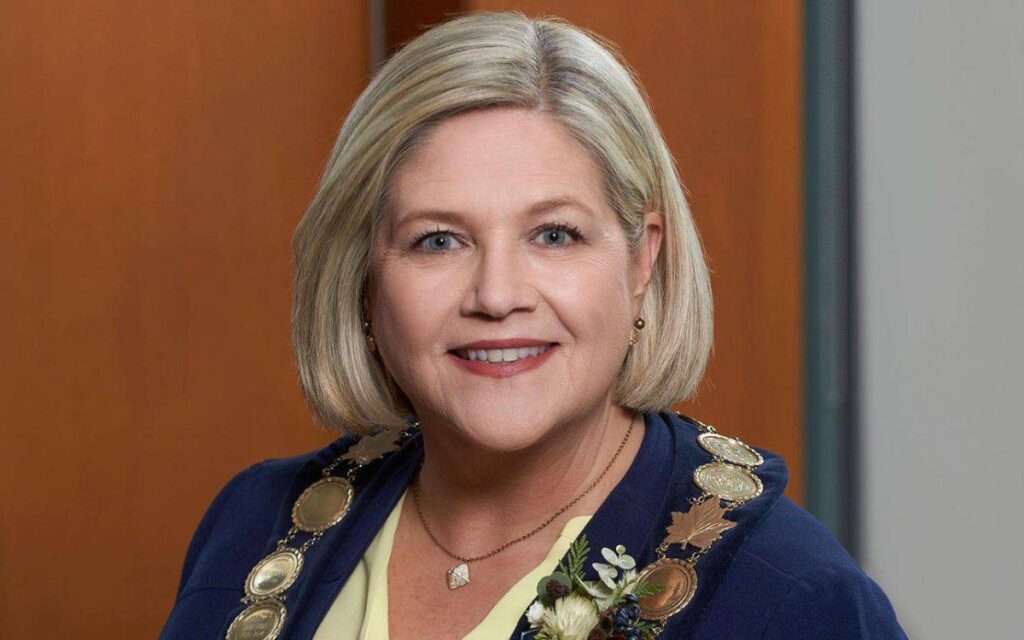
In response to the findings, Hamilton Mayor Andrea Horwath called for more funds from provincial and federal governments. Pictured: Mayor Andrea Horwath. Photo Credit: City of Hamilton.
A new report from the Association of Municipalities of Ontario (AMO), which represents Ontario’s 444 municipal governments, has determined that more than 80,000 people in Ontario experienced homelessness in 2024 and that an investment of $11 billion over 10 years is needed.
The report adds that the number of those experiencing homelessness has increased more than 25 per cent since 2022.
Additionally, the number of people experiencing prolonged or repeated episodes of homelessness has tripled since 2016.
A press release from the City of Hamilton following the report notes that the municipality currently has approximately 1,500 to 1,600 homeless individuals, with an estimated 251 in encampments.
In addition, the city says there are approximately 747 shelter beds.
When it comes to funds to address homelessness, the City of Hamilton spent $158 million in 2024 to “increase affordable housing and reduce homelessness,” which was a 26 per cent ($33 million) increase over 2023.
The city’s spending on affordable housing and addressing homelessness is one of the main reasons why municipal property taxes in the city have increased higher than normal over the past couple of years.
The AMO report adds that in addition to $11 billion over 10 years to boost the supply of supportive, transitional, and community housing, an estimated $2 billion over eight years is needed to “solve the challenge of homeless encampments.”
In response to those findings, Hamilton Mayor Andrea Horwath called for more funds from provincial and federal governments.
“The fact is, while there has been some funding from both senior levels of government which we acknowledge and appreciate, it is nowhere near the scale of investment that is required,” Horwath said.
“A significant ramping up of financial assistance from our partners is beyond urgent.”
It is unclear whether spending the billions more requested on affordable housing and homelessness is financially sustainable for both the provincial and the federal governments.
The Ontario government already announced in December that they would be spending an additional $75.5 million on affordable housing and shelter spaces, with $50 million going towards affordable housing, $20 million for shelters, and $5.5 million for rent supplements.
The Ontario government is also spending $700 million on homelessness prevention and $529 million to create 27 new Homelessness and Addiction Recovery Treatment Hubs (HART Hubs) across the province, including one in the City of Hamilton.
All of that funding comes as the Government of Ontario posted a $9.8-billion budget deficit in 2024.
The Canadian government also announced in January that they are signing deals with nine Ontario municipalities, including the City of Hamilton, and two Saskatchewan cities to provide $91.5 million over two years to tackle homelessness.
It is unclear how much each municipality will receive individually, although the government notes that $88 million will go towards the Ontario cities and $8 million to the cities in Saskatchewan.
The municipalities will reportedly be matching the federal funding.
The federal government is also investing $1.6 billion in Ontario through their “Reaching Home: Canada’s Homelessness Strategy.”
But all of the Government of Canada’s spending comes as their 2024 Fall Economic Statement showed that the deficit for the 2023-24 fiscal year was $61.9 billion which was $21.9 billion higher than the already high $40 billion deficit they had projected.
As for what has caused the housing crisis, the Canadian Housing Evidence Collaborative notes that Canada’s population has increased dramatically, with large numbers of immigrants, refugees, temporary foreign workers, and international students being allowed to enter the country over the past few years by the federal government, that municipal approvals for new housing are slow, and that increased money supply during the 2020 pandemic fueled inflation.
They also list a number of other factors which can be found on their website here.
So while Horwath continues to ask for the “significant ramping of financial assistance” it appears that such a request would either result in even higher government deficits or a significant increase in taxes to fund additional investments.

Based in Hamilton, he reaches hundreds of thousands of people monthly on Facebook, Instagram, TikTok, and Twitter. He has been published in The Hamilton Spectator, Stoney Creek News, and Bay Observer. He has also been a segment host with Cable 14 Hamilton. In 2017, he received the Chancellor Full Tuition Scholarship from the University of Ottawa (BA, 2022). He has also received the Governor General’s Academic Medal. He formerly worked in a non-partisan role on Parliament Hill in Ottawa.






